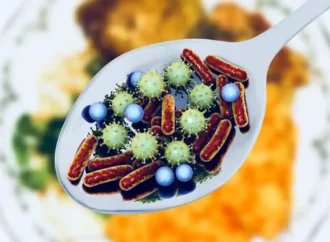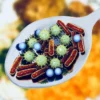Ever wondered if the food on your plate is completely safe? While we often worry about pesticides and preservatives, heavy metals like arsenic, lead, mercury, and cadmium pose an even greater hidden risk. These toxic metals enter our food through polluted water, soil, and air, making their way into rice, fish, vegetables, spices, and even packaged foods. Over time, they can cause serious health problems if we aren’t careful.
Industrial pollution, excessive use of chemical fertilizers, and contaminated irrigation water contribute to heavy metal contamination. As a result, common foods like wheat, leafy vegetables, seafood, and even spices like turmeric and chilli powder may contain traces of these metals. While our bodies can tolerate small amounts, long-term exposure can lead to severe health issues.
The Danger of Arsenic, Lead, Mercury, and Cadmium in Food

These heavy metals accumulate in the body over time, leading to organ damage, developmental issues, and chronic diseases.
Arsenic – Found in Rice and Drinking Water
Arsenic is naturally present in groundwater, which is why rice and drinking water in parts of India—especially West Bengal, Bihar, Assam, and Uttar Pradesh—have higher levels. Long-term exposure can cause skin diseases, cancer, and heart problems. Studies show that consuming contaminated rice daily increases the risk of chronic illnesses.
Lead – Found in Vegetables, Spices, and Old Pipes
Lead can enter food from polluted soil, old water pipes, and even some imported spices and cosmetics. Lead poisoning damages the brain, kidneys, and nervous system, especially in children.
One major concern is lead contamination in turmeric powder. Some manufacturers illegally add lead chromate to enhance the yellow colour, while in other cases, turmeric absorbs lead from contaminated soil. Remember the controversy over lead in instant noodles? Even small amounts can affect a child’s IQ and development, making it a serious public health concern.
Mercury – Found in Fish and Seafood
Mercury pollution mainly comes from industrial waste dumped into water bodies. As a result, larger fish like tuna, shark, and some local varieties may have high mercury levels. Consuming too much mercury can harm brain function, affect pregnant women, and slow a child’s growth. Experts recommend that pregnant women and young children limit their intake of large fish and choose smaller, locally available varieties instead.
Cadmium – Found in Leafy Vegetables, Shellfish, and Spices
Cadmium is released into the environment through industrial waste, batteries, and fertilizers. It gets absorbed by plants, making leafy greens, rice, shellfish, and even some spices vulnerable to contamination.
Long-term exposure can damage the kidneys, weaken bones, and increase the risk of cancer. Since cadmium builds up in the body over time, even low-level exposure can be harmful. Spices grown in polluted soil or processed without safety checks may contain traces of cadmium, making it essential to buy from trusted sources.
How to Reduce Heavy Metal Exposure in Daily Life
While avoiding these metals completely is impossible, we can reduce exposure with smart food choices.
Wash and Cook Your Food Properly
- Soak and rinse rice before cooking; using extra water and draining it can remove some arsenic.
- Wash vegetables thoroughly to remove surface contaminants.
- Peel root vegetables like carrots and potatoes to eliminate soil-based toxins.
- Avoid cooking acidic foods (like tomato-based dishes) in aluminum or low-quality metal utensils to prevent leaching of harmful substances.
Be Mindful of the Fish You Eat
- Limit big fish like tuna and shark, which accumulate more mercury.
- Choose smaller fish like mackerel and sardines, which are safer.
- Buy fresh, locally sourced fish from cleaner water bodies whenever possible.
Avoid Low-Quality or Unverified Food Products
- Be cautious with turmeric powder—some brands may contain added lead chromate.
- Buy trusted brands with food safety certifications for spices, cosmetics, and traditional medicines.
- Choose organic or locally sourced spices whenever possible.
- Use stainless steel, glass, or clay cookware instead of cheap plastic or low-grade metal utensils.
- Check for food safety certifications and avoid unverified products.
Maintain a Balanced Diet
- A diet rich in iron, calcium, and vitamin C can help reduce heavy metal absorption.
- Eat more fibre-rich foods like whole grains and green vegetables to flush out toxins.
- Drinking plenty of water and consuming antioxidant-rich foods can support the body’s detox process.
What Is the Government Doing?
India has food safety laws, but enforcement is key. The Food Safety and Standards Authority of India (FSSAI) monitors contamination levels and sets maximum limits for heavy metals in food.
Regulations and Safety Measures
- Maximum permissible limits are set for arsenic, lead, mercury, and cadmium.
- Regular food inspections focus on rice, packaged food, seafood, and spices.
- Bans on pesticides that contribute to soil contamination.
- Stricter rules on lead in paint, pipes, and food packaging.
- Water purification projects in high-risk areas.
Despite these efforts, enforcement gaps remain, and small-scale manufacturers often bypass safety regulations. Consumers must stay aware and take precautions.
Stay Informed, Eat Smart!
Food contamination is a real concern, but smart food choices, safe cooking practices, and awareness can help reduce risks. Heavy metals may be invisible, but the right habits can keep them out of our bodies.
Quick Tips
- Buy organic or locally grown vegetables.
- Use filtered water.
- Avoid excess processed foods.
- Choose trusted brands for spices like turmeric.
- Stay informed about food safety guidelines.
A little awareness goes a long way in keeping your food safe and healthy!
 Food Manifest
Food Manifest 















